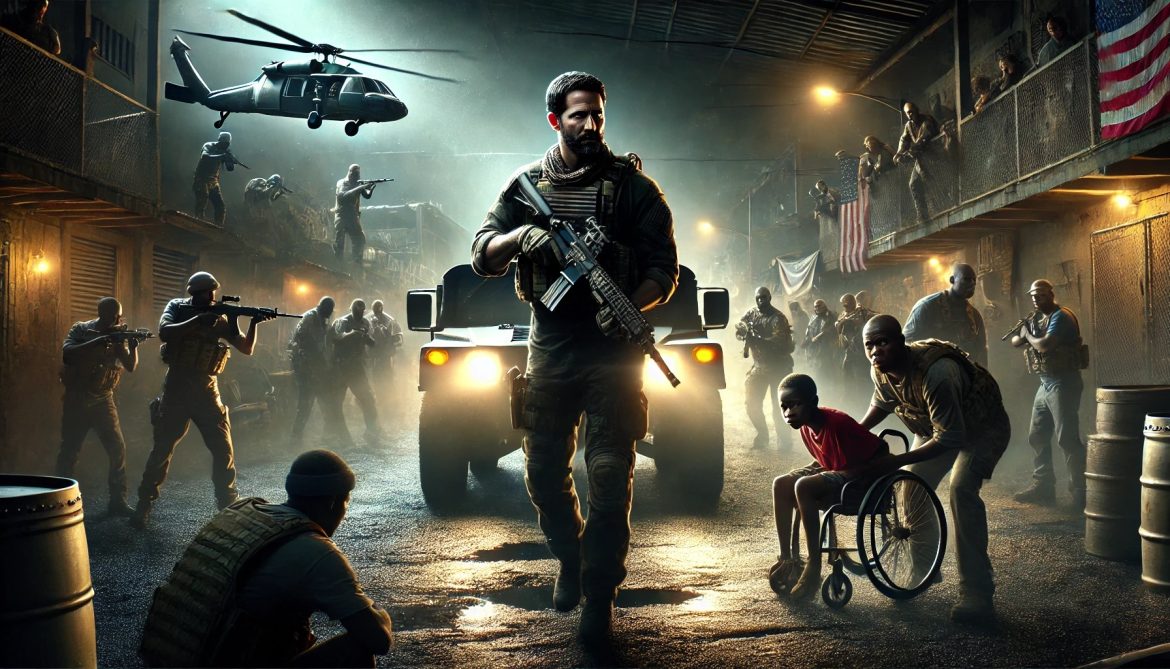In the aftermath of the assassination of Haitian President Jovenel Moïse in July 2021, Haiti plunged into a state of chaos. With the already fragile nation destabilized, gangs such as Jimmy Chérizier’s G9 took control of significant portions of the capital and surrounding areas. Streets became battle zones, and the government struggled to maintain any semblance of order. Amid this turmoil, thousands of American citizens and vulnerable Haitian children were left stranded, with little hope of escape.
Cory Mills, a U.S. Congressman and veteran, was thrust into this volatile situation. As the U.S. government grappled with logistical and political hurdles, there was no clear plan in place to evacuate stranded Americans. In the face of such uncertainty, Mills, along with humanitarian organizations, made the decision to act. For Mills, this mission was about much more than leadership—it was about courage, compassion, and stepping in where others could not.
Humanitarian Rescue Missions: Stepping Up Where Governments Fell Short
Mills partnered with Mercury One, an organization founded by Glenn Beck, and the Tim Tebow Foundation to spearhead a high-risk series of rescue missions. The objective: to evacuate not only Americans but also Haitian missionaries and vulnerable children trapped in gang-controlled regions. These were no ordinary rescue operations—they required stealth, precise coordination, and a willingness to confront the unknown dangers that awaited.
As Mills recalls, “When the U.S. government had no plan to rescue Americans, we stepped in.” His team launched multiple night missions to rescue Americans and children caught in the conflict zones. The decision to conduct the operations under cover of darkness was crucial, as the streets were controlled by heavily armed gangs. Nighttime operations allowed for more covert movement, but they also came with their own set of risks.
Navigating Danger: A Complex Operation
The most emotionally challenging part of the rescue effort came with the mission to save 59 disabled children who had been abandoned in an orphanage. These children were defenseless, left at the mercy of gangs who had no regard for their well-being. The team’s task was to not only navigate hostile environments but to ensure the safety of the children, coordinating escape routes and extraction points amidst violent clashes. Without Mills and his team’s intervention, the fate of these children would have been tragic.
As Mills described, these rescues were filled with heart-stopping moments, including when they loaded the children onto vehicles, unsure if they would be detected by the gangs. The tension was palpable, as the smallest mistake could lead to disastrous consequences. Despite the challenges, the team pressed forward, driven by a commitment to their humanitarian mission.
The operation was an overwhelming success. Mills and his team evacuated the disabled children, who were eventually transported to safety in Jamaica. In addition to these children, the team managed to rescue dozens of Americans and Haitian missionaries who had been hiding in a local church. For all involved, the mission represented more than just an escape—it was a second chance at life.
Partnerships and Teamwork: Keys to Success
Mills credits much of the mission’s success to the partnerships he formed along the way. Mercury One provided vital logistical support, while the Tim Tebow Foundation brought resources and attention to the plight of the vulnerable. “This wasn’t just about flying in and pulling people out,” Mills explained. “It was about coordinating with those on the ground, working with people who knew the lay of the land, and being smart about how we moved through these dangerous areas.”
The success of these missions was not only a testament to Mills’ leadership but also to the importance of working with trusted local partners. Their knowledge of the region and ability to provide real-time intelligence were invaluable in navigating the dangers of Haiti’s unstable political climate.
For the 59 disabled children, this mission meant a second chance. These children, who had been left behind in one of the most dangerous places in the world, were given a chance at a new life, safe from the violence that threatened their very existence.
True Servant Leadership in Action
Cory Mills’ Haiti rescue missions underscore a central tenet of his leadership style: stepping in where others fall short. “We couldn’t stand by and do nothing,” Mills stated. “When lives are at stake, action is required.”
These missions required personal risk, but they also required the kind of servant leadership that Mills believes in—putting others’ needs above one’s own, especially in times of crisis. In the absence of governmental coordination, Mills and his team filled the void, providing hope where none had previously existed.
A Broader Call to Action: Applying Courage at Home and Abroad
In the same way Mills took action in Haiti, he also believes in the power of individuals stepping up in times of need. Whether in foreign humanitarian crises or in efforts closer to home, Mills consistently advocates for proactive leadership. “Courage is contagious,” he said during the podcast interview with Glenn Beck. Mills emphasized that when one person steps up to make a difference, others are inspired to follow.
In the same interview, Mills reflected on another critical rescue mission, this time in Israel following the October 7th attack by Hamas. Just days after the attacks, Mills and his team organized evacuations to rescue Americans from northern Israel, an area under threat from Hezbollah. The operation, conducted in a war zone, was a high-stakes endeavor, yet it mirrored the same spirit of courage and leadership Mills had displayed in Haiti.
From Israel to Haiti, Cory Mills has consistently demonstrated that true leadership isn’t about waiting for others to take action. It’s about recognizing when something needs to be done and stepping in, regardless of the personal risks involved. Mills’ philosophy is one of servant leadership—putting others first, particularly in moments of crisis when lives hang in the balance.
Conclusion: Haiti and Beyond—A Life of Service
The Haiti rescue operations serve as a powerful example of Cory Mills’ commitment to making a difference where it matters most. In a nation ravaged by political instability, where even governments struggled to function, Mills and his team became the last hope for many. His actions exemplified what it means to be a true servant leader, prioritizing others and responding to humanitarian crises with compassion, courage, and conviction.
Whether rescuing disabled children from the streets of Haiti or navigating complex geopolitical challenges abroad, Mills’ life of service continues to inspire others to step up when needed most. As he concludes in his conversation with Glenn Beck, “We all have a role to play in making the world a better place. It starts with recognizing the need and taking action.”
Image Source: Fox News | YouTube Screen Shot
Related:
- Cory Mills: From Humble Beginnings to Serving in the U.S. Military and Representing Florida in Congress
- Israel Rescue Operations: Solo Mission of Courage – How Cory Mills Rescued Americans from Hezbollah’s Grasp
- From Crisis to Courage: How Cory Mills Led Haiti’s Rescue Efforts A Story of Bravery and Humanity in the Face of Unimaginable Danger
- Cory Mills: A Statesman’s Perspective on Trump, the Middle East, and Security Threats
- Cory Mills: War, Leadership, and Accountability: Cory Mills on the Path Forward for the U.S.




